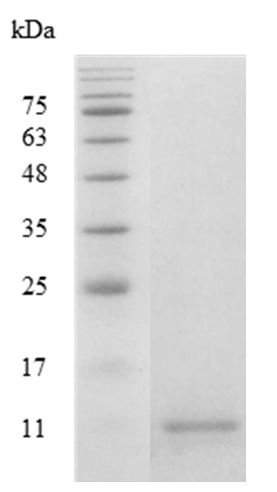| Product name | Human CCL4 Protein (Animal-Free) |
| Sequence | Amino acid sequence derived from Human CCL4 (Ala24-Asn92) (P13236) was expressed |
| Applications | No tag |
| Applications notes | Human |
| Activity | Measured by its ability to chemoattract BaF3 cells transfected with human CCR5.The ED50 for this effect is <10 ng/mL |
| Protein length | The recombinant Human CCL4 consists of 69 amino acids and predicts a molecular mass of 7.75 kDa |
| Preparation method | E. coli |
| Purity | >98% as determined by SDS-PAGE. |
| Alternative | MIP-1b: Macrophage Inflammatory Protein-1β, ACT-2 |
| Formulation | Lyophilized from 50 mM Tris, 150 mM NaCl, pH 8.5 |
| Features & Benefits | Endotoxin: <0.1 EU per 1 μg of the protein by the LAL method. |
| Molecular weight | 7.75 kDa |
| Usage notes | Always centrifuge tubes before opening. It is recommended to reconstitute the lyophilized recombinant protein to a concentration of 0.1-1 mg/mL using the buffer we provided, and keep at room temperature for at least 20 min to fully dissolve. Please avoid vortex vigorously |
| Storage instructions | Lyophilized protein product should be stored desiccated below -18°C. Upon reconstitution, the protein should be stored at 4°C between 2-7 days and for future use below -18°C. For long term storage it is recommended to add a carrier protein (5% HSA , 10%FBS or 0.1%BSA). Please prevent freeze-thaw cycles |
| Shipping | Gel pack with blue ice. |
| Precautions | The product listed herein is for research use only and is not intended for use in human or clinical diagnosis. Suggested applications of our products are not recommendations to use our products in violation of any patent or as a license. We cannot be responsible for patent infringements or other violations that may occur with the use of this product. |
| Background | CCL4 (C-C chemokine ligand 4), is a macrophage inflammatory protein with a chief effect in inflammation and immune-regulation, and was documented in cancer progression by promoting instability in the tumor environment. The inflammatory chemokine (C-C motif) ligand 4 (CCL4) plays an important role in the pathogenesis and progression of cancer. In particular, higher serum CCL4 levels in patients with oral squamous cell carcinoma (OSCC) are associated with a more advanced stage of disease. CCL4 may be a new molecular therapeutic target for inhibition of lymphangiogenesis and metastasis in OSCC. CCL3 and CCL4 loci may be marker SNPs for risk of HCV treatment outcome. CCL4 can enhance the recruitment of preosteoclasts to bone in the early stage, and the reduction of CCR5 promotes osteoclastogenesis when RANKLis prevalent |
| Alternative | MIP-1b: Macrophage Inflammatory Protein-1β, ACT-2 |
| Accession | P13236 |

You must be logged in to post a review.
Reviews
There are no reviews yet.